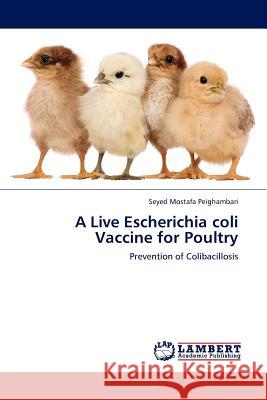A Live Escherichia coli Vaccine for Poultry » książka
A Live Escherichia coli Vaccine for Poultry
ISBN-13: 9783845412757 / Angielski / Miękka / 2011 / 120 str.
In spite of widespread use of antibacterial agents to control colibacillosis in poultry, the development of an effective vaccine has been an important goal for researchers. Compared to bacterins and subunit vaccines, live vaccines are attractive because they are much cheaper than purified proteins, and can be used for mass immunization via aerosol, feed, or drinking water. Our goals in this research were to construct non-revertible mutant derivatives of avian pathogenic strains of E. coli and to evaluate their potential ability to protect chickens against experimental disease. cya crp mutants of two avian septicemic E. coli strains were constructed and shown to be attenuated in virulence and non-reverting. The immunogenicity and efficacy of the double mutant strains were assessed in an aerosol-based challenge model. The present vaccine has the potential to be inexpensive and effective against E. coli infections in poultry. When the laboratory studies indicate that there is greater protection against the experimental challenge, a field trial is needed as challenge under the natural environment may be quite different from the single massive exposure that is used experimentally."
In spite of widespread use of antibacterial agents to control colibacillosis in poultry, the development of an effective vaccine has been an important goal for researchers. Compared to bacterins and subunit vaccines, live vaccines are attractive because they are much cheaper than purified proteins, and can be used for mass immunization via aerosol, feed, or drinking water. Our goals in this research were to construct non-revertible mutant derivatives of avian pathogenic strains of E. coli and to evaluate their potential ability to protect chickens against experimental disease. Δcya Δcrp mutants of two avian septicemic E. coli strains were constructed and shown to be attenuated in virulence and non-reverting. The immunogenicity and efficacy of the double mutant strains were assessed in an aerosol-based challenge model. The present vaccine has the potential to be inexpensive and effective against E. coli infections in poultry. When the laboratory studies indicate that there is greater protection against the experimental challenge, a field trial is needed as challenge under the natural environment may be quite different from the single massive exposure that is used experimentally.











